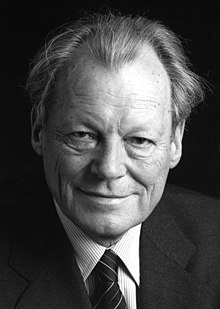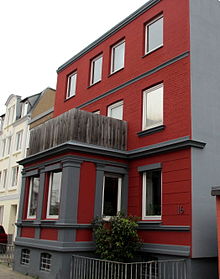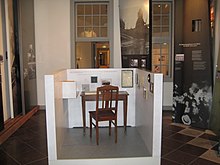Willy Brandt
![]()
This article is about the politician Willy Brandt. For the educator see Willy Brandt (educator).
![]()
Willy Brandt (* 18 December 1913 in Lübeck as Herbert Ernst Karl Frahm; † 8 October 1992 in Unkel) was the fourth Chancellor of the Federal Republic of Germany from 1969 to 1974 as head of government of a social-liberal coalition of SPD and FDP. Previously, he had held the office of foreign minister and vice chancellor from 1966 to 1969 during the first grand coalition in the Kiesinger cabinet. Until he joined the Federal Government, he had been Governing Mayor of Berlin from 1957.
Brandt was SPD party chairman from 1964 to 1987 and president of the Socialist International from 1976 to 1992.
Under the motto of change through rapprochement, Brandt as Chancellor abandoned West Germany's foreign policy, which until the end of the 1960s had been based on the Hallstein Doctrine, and with his new Ostpolitik he ushered in a caesura in the politically confrontational climate of the Cold War. With the treaties with Eastern Europe he began a course of détente and conciliation with the Soviet Union, the GDR, Poland (the Warsaw genuflection) and the other Eastern Bloc countries. For this policy Brandt received the Nobel Peace Prize in 1971.

Willy Brandt (1980)
Childhood and youth
Family
Willy Brandt was born Herbert Frahm on 18 December 1913 in the Lübeck suburb of St. Lorenz-Süd. Brandt's birth was illegitimate. His mother was Martha Frahm, née Ewert (1894-1969), herself born out of wedlock, a saleswoman at the Lübeck Konsumverein. Brandt's father was the Hamburg teacher John Heinrich Möller (1887-1958), who taught temporarily at a secondary school in Lübeck in 1912 and 1913. Martha Frahm did not give the name of the child's father when the birth of her son Herbert was registered at the registry office. On 26 February 1914, Martha Frahm had her son baptized in Pastorate II of the Protestant Church of St. Lorenz in Lübeck; baptism in the parish church was not granted to children born out of wedlock.
Brandt never got to know his biological father personally, although he had known his father's identity since 1947. Brandt had a distant, undercooled relationship with his mother, who is described as overtaxed, from childhood on. In retrospect, he called her "the woman who was my mother".
Brandt initially grew up in the household of his mother, who worked and had a neighbor take care of him on weekdays. From 1919, Brandt's step-grandfather Ludwig Frahm (1875-1935) took over the care of the child. Frahm had married Martha Ewert's mother Wilhelmine in 1899, and after his return from World War I, he quickly established a close relationship of trust with the five-year-old Brandt. He took him into his household and kept him in his care throughout the 1920s, even after he entered into a new marriage with Dorothea Stahlmann, Brandt's little-loved "Aunt Dora," following Wilhelmine's death. Willy Brandt called his step-grandfather "Papa." His high school diploma named Ludwig Frahm as his father. In September 1927, Brandt's mother married Emil Kuhlmann, a foreman, and in February 1928, Brandt's half-brother Günther Kuhlmann was born. From that time on, Brandt saw his mother "only sporadically." In retrospect, Brandt described his youth as "unhappy" and his family circumstances as chaotic.
Brandt's illegitimate birth, which was often seen as a flaw by contemporaries, was used by political opponents to disparage him even during the Federal Republic. He did not defend himself against it, but he confessed that "origin and slander" had "implanted a sting" in him. Even in the 1965 Bundestag election campaign, in which Brandt ran for the SPD against the CDU candidate Ludwig Erhard, this circumstance was made an issue.
School education
Brandt attended the St.-Lorenz-Knaben-Mittelschule, from 1927 the v. Großheim'sche Realschule and in 1928 changed to the Johanneum in Lübeck, where he passed his Abitur in 1932. In his application for admission to the Abitur he named journalist as his career aspiration. The SPD initially offered Brandt a party scholarship for university studies. After he parted ways with his party in a dispute, this option was dropped. Instead, Brandt began a traineeship in May 1932 at the shipbroking firm, Reederei und Spedition F. H. Bertling KG in Lübeck.

Brandt's birthplace in Lübeck's Meierstraße (2013)
Political activity in the Weimar Republic
Brandt's interest in politics can be traced back to his step-grandfather Ludwig Frahm. Frahm belonged to the SPD, was for a time his party's shop steward in the Lübeck district of Holstentor-Süd, and ran for the Lübeck city council on the SPD list in 1926 and 1929. In 1925 Brandt became a member of the Kinderfreunde, a children's group of the Falken, and from April 1929 of the Sozialistische Arbeiter-Jugend (SAJ), in which he advocated a radical course as a member of the Lübeck Karl Marx group with the support of Julius Leber. In 1931 Brandt became district chairman of the SAJ for the Lübeck-Mecklenburg region.
In this environment Brandt was regularly active as a journalist from 1927 onwards. In February 1927, the Lübecker Volksbote, the local SPD newspaper edited by Julius Leber, printed an essay by Brandt with two drawings about a day hike by the student with friends to the Travequelle. From 1928 Brandt published texts on political topics. Leber supported Brandt and at the same time encouraged his political involvement. Brandt later stated that Leber had been a decisive influence on him during these years. His school performance suffered as a result of his journalistic activities. A teacher at his school advised his mother in 1930: "Keep your son away from politics. The boy has good potential. But politics will ruin him".
In 1930 Brandt joined the SPD. A year later, in October 1931, he broke with Leber and the SPD, accusing the party - disappointed by its policy of tolerating the measures of the conservative government of Reich Chancellor Heinrich Brüning - of "despondency" with regard to social change. Brandt then joined the Socialist Workers' Party of Germany (SAPD). This had been formed from a left-wing socialist group that had split off from the SPD Reichstag faction in the fall of 1931, together with other organizations positioned between the SPD and the KPD, such as the rest of the USPD around Theodor Liebknecht or Ledebour's Socialist League, as a party of the united front to combat the anti-democratic right, which had been strengthened since the beginning of the Great Depression and was allied in the Harzburg Front around the NSDAP and DNVP. Brandt was a founding and executive board member of the Lübeck chapter of the SAPD and subsequently also took on numerous organizational tasks for the party as a whole.

Reconstructed study of the young Willy Brandt (then Herbert Frahm) in the Willy Brandt House Lübeck
Questions and Answers
Q: Who was Willy Brandt?
A: Willy Brandt was a German chancellor from 1969 until 1974.
Q: What was Willy Brandt's birth name?
A: Willy Brandt's birth name was Herbert Ernst Karl Frahm.
Q: When was Willy Brandt born?
A: Willy Brandt was born on December 18, 1913.
Q: Where was Willy Brandt born?
A: Willy Brandt was born in Lübeck, Germany.
Q: What political party was Willy Brandt the leader of?
A: Willy Brandt was the leader of the Social Democratic Party of Germany from 1964 to 1987.
Q: What award did Willy Brandt win in 1971?
A: Willy Brandt won the Nobel Peace Prize in 1971.
Q: Where did Willy Brandt pass away?
A: Willy Brandt passed away on October 8, 1992 in Unkel on the Rhine.
Search within the encyclopedia